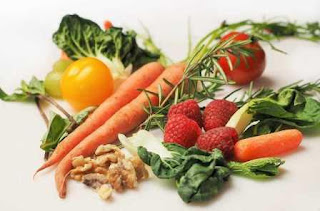 |
| Eat this for a balanced diet |
Balanced diet menu
- Eat 5 fruit and vegetables for breakfast
- Eat a good source of protein for lunch
- Have a healthy combination of food for dinner
- Have healthy snacks in between meals if you need to
- Make water your primary source of hydration
 |
| Share or save this image to remember. |
1. Eat 5 fruit and vegetables for your first meal of the day
You need to eat five fruit and vegetables every day. This will give your body the vitamins, minerals, trace elements, fiber, antioxidants and other plant compounds that it needs. The first meal needs to consist of 5 different, raw, whole, unprocessed fruit or vegetables.
5 fruit and vegetables for weight loss
Many people are worried about the sugar and carbohydrates of eating 5 whole fruit and vegetables every day.
Fruit and vegetables cause fat loss. In fact, a trendy fruit-only diet causes to rapid weight loss in a matter of days.
I wouldn't recommend this diet because it is low in protein - even though weight is reduced very quickly. The point is that fruit and vegetables cause you to lose fat and nourish your body with important nutrients at the same time.
Why do fruit and vegetables lead to fat loss?
Fruit and vegetables are high in water and fiber. The water content fills you up very quickly without many calories that could be turned into fat.
Your digestive system can't break fiber into usable nutrients. The combination of water and fiber keep your digestive system full for a long period of time before it gets empty and needs more food.
This is why fruit doesn't spike your blood sugar in the same way as the added sugars from processed food like cereal. Fiber prolongs the release of the sugars in fruit and vegetables.
You get a small influx of sugar that lasts for hours. The sugar in processed food is dumped into your system immediately. This leads to the sugar spikes that cause diabetes, weight gain and other health issues.
It is a great idea to full up on fruit and vegetables for you first meal so that you feel more satisfied for the rest of the day. You won't start the day on a sugar-powered roller-coaster of energy.
Why should I eat 5 fruit and vegetables per day?
You should eat at least 5 fruit and vegetables every day - regardless of whether you want to lose weight or not. Here's why:
- Fruit and veg prevent cancer, heart disease and mental illnesses
- They are high in vitamins, minerals, antioxidants and other important nutrients
- The fiber in fruit and vegetables feed good gut bacteria that protect the immune system, produce important brain chemicals, regulate nutrients and prevent disease
 |
| 5 a day keeps the doctor away. |
Which fruit and vegetables should I eat every day?
You can choose any 5 fruit and vegetables according to your budget, product availability, taste preference and season. Just make sure that you eat 5 different kinds every day and that they are fresh (uncooked and unprocessed). Raw fruit and veg are super healthy.
List of healthy raw fruit
- Apple
- Apricot
- Avocado
- Banana
- Berries
- Cantaloupe
- Cherries
- Clementine
- Coconut
- Dates
- Figs
- Grapefruit
- Grapes
- Guava
- Kiwifruit
- Lemon
- Lime
- Litchi
- Mandarin
- Mango
- Melon
- Nectarine
- Olives
- Orange
- Papaya
- Passion Fruit
- Peach
- Pear
- Pineapple
- Plum
- Pomegranate
- Strawberries
- Tangerine
- Watermelon
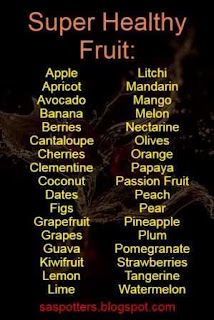 |
| Great fruit ideas |
List of healthy raw vegetables
2. Eat a good source of protein for lunch
The first meal should give you almost all of the micro nutrients that you need. There are some nutrients, however, that fruit and vegetables don't usually have.
The second meal focuses on protein (which is also extremely important for your health). Protein-rich foods typically give you better sources of Iron and Vitamin B as well.
Why is protein so important?
Protein makes up every cell in your body. Cells die off and need more protein to regenerate.Your body can store energy in the form of glycogen (sugar stored in the muscles and the liver) and fat, but it can't store protein.
If you don't eat enough protein regularly, muscle tissue will break down so that the body can fulfill its most vital functions (because protein is much than just a building block).
Muscle wastage from protein deficiency can lead to weakness, low metabolism, weight loss in some and weight gain in others, low energy levels, and faster age-related health decline.
How often do our cells regenerate?
Your entire body regenerates at an average of every 7 to 15 years.The lining of your stomach and intestines are replaced every 5 days. Your skin regenerates every 2 to 4 weeks. Red blood cells regenerate every 6 months or so. Your liver regenerates every 2 years or less. Bone cells regenerate over 10 years (and the process slows as we age). Parts of the eye and teeth enamel don't regenerate at all. Some parts of the brain regenerate, while others don't.
What other roles does protein play in the body?
Cells aren't the only things that rely on protein for generation. Hormones, enzymes and other chemicals need protein just as much as cells for their formation. Your immune system depends on protein to work properly.What happens when you don't get enough protein?
Signs of protein deficiency include:- Muscle wasting
- Poor wound healing
- Recurring infections
- Low energy
- Pale skin
- Brittle hair and nails
- Dry, itchy skin
- Constant hunger cravings
 |
| Eat enough protein. |
How much protein do you need per day?
You should get 0.8 grams of protein per kilogram of body weight (or 0.36 grams per pound) every day. That's 56 grams for the average male and 46 grams for the average female.Dedicate your second meal to protein so that you get enough of this precious nutrient.
Good sources of protein
- Eggs
- Nuts
- Nut butters
- Chicken
- Oats
- Dairy
- Beef
- Pork
- Turkey
- Fish
- Beans
- Lentils
- Legumes
- Quinoa
- Seeds
- Seafood
- Soy
- Peas
Animal sources of protein
- Eggs
- Chicken
- Dairy
- Beef
- Pork
- Turkey
- Fish
- Seafood
Plant sources of protein
- Nuts
- Nut Butters
- Oats
- Beans
- Lentils
- Legumes
- Quinoa
- Seeds
- Soy
- Peas
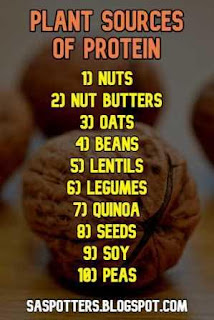 |
| Share this image on social media. |
3. Have a combination of healthy foods for dinner
The first meal will give your body all of the fiber and most of the micro nutrients (vitamins, minerals, antioxidants, etc.) that it needs. The second meals will give you the missing nutrients like protein, iron and vitamin B.
The third meal gives you another important aspect of your daily nutrition requirements: calories. Calories are a measurement of food according to the amount of energy that they contain.
Fruit and vegetables are typically very low in calories because they contain so much water and fiber. Protein should be used for rebuilding your cells and other important bodily functions. You therefore need more calories from food so that you have enough energy.
Many people like to reduce their calories when they go onto a balanced diet. This can lead to disastrous side effects.
Negative effects of calorie restriction
Your body needs calories to produce energy. Without calories, your body won't have the energy that it needs to do many important things.
- Infertility
- Weaker bones
- Slow metabolism
- Weight gain
- Low energy
- Weak immune system
- Low concentration or focus
- Moodiness
- Depression
- Lack of motivation
- Hunger cravings
- Addictive behavior
- Hormonal imbalances
- Muscle loss
- Weakness
 |
| Don't eat too little. |
Will I gain weight if I don't restrict my calories?
Remember that the fruit and vegetables will keep you fuller for longer. The protein from the second meal will have the same effect. You will notice that you have more energy and that you aren't as hungry so often because of these two meals.
If you eat great, your body will look great. You will be at a healthy weight when you are healthy.
There are 7 ways to get healthy (and calorie restriction isn't one of them). Eat right (and avoid unhealthy food), exercise regularly, drink enough water, look after your gut, sleep enough, take care of your mental state and practice good hygiene. None of these healthy habits are negotiable when it comes to your health.
If you do all of these things, you will have more energy because your body can perform all of its functions properly. One of those functions is energy creation through fat metabolism.
Unhealthy food causes weight gain. Added sugar and artificial sweeteners in processed food lead to weight gain.
 |
| Share this image to inspire yourself. |
Fasting is a much better way to lose fat than calorie restriction. Exercise burns fat, improves metabolism and does over 100 other greater things to your body.
Unhealthy foods to avoid
You might not restrict your calories, but you shouldn't eat anything that is available. Unhealthy food will hurt your body and lower its energy production as a result. Avoid these foods:
- Fast food
- Fried food
- Pastries
- Cereals
- Processed meat
- Energy drinks
- Sugar in coffee and tea
- Soda
- Condiments like ketchup and mustard
 |
| Save your health. |
Healthy combinations of food
Eat the following healthy food ideas for dinner instead:
- Chicken, pumpkin and brown rice
- Roast beef with squash and spinach
- Steak, corn and sweet potatoes
- An omelet with cheese, tomato and ham
- Vegetable stir fry with fish
- Avocado chicken salad
- Peanut butter and whole wheat bread
- Yogurt and mixed berries
4. Have healthy snacks between meals when needed
If you still feel hungry in between any of these meals, you can have a healthy snack. You get to choose a food from any of the above three meals.
Do you have left over from last night's dinner? No problem! Just make sure that you don't skip out on any of your three main meals because they are the most important. Don't skip out on your daily fruit and vegetables, for example, because you made too much chicken and sweet potatoes for dinner last night.
If you still want to reduce your calories, aim for green leafy vegetables as snack because they are extremely low in calories.
5. Make water your primary source of hydration
Almost half the western world doesn't drink enough water. Every cell in your body needs water. Blood uses water to transport nutrients or toxins from one part of your body to another.
Symptoms of dehydration:
- Darker urine
- Slow metabolism
- Laziness
- Low energy
- Sleepiness
- Lack of concentration or focus
- Moodiness
- Depression
- Increased water weight
- Weak immune system
- Heart health decline
- Hunger
- Cravings for sugar, caffeine, nicotine or alcohol
- Headaches
- Bad skin
- Overall weakness
- Constipation and other digestive issues
- Poor kidney health (kidney stones, kidney failure)
- Erectile dysfunction
- Dry eyes and eye strain
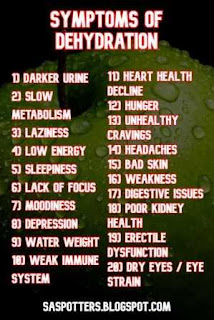 |
| Drink enough water. |
How to stay hydrated
- Keep a water bottle with you wherever you go.
- Drink a glass of water before you satisfy a craving for sugar, caffeine or nicotine - you will be surprised by how often your body was just thirsty!
- Keep a large jug of water on your desk - you will automatically sip on it while you work.
- Have a glass of water before your first cup of coffee or tea in the morning.
Additional notes on the balanced diet menu
- Don't eat too close to bed time. This can reduce overall sleep quality and cause digestive issues.
- Limit junk food as much as you can. Processed food is the number one contributor to obesity and bad health.
Conclusion
A balanced diet will give your body all of the nutrients that it needs. It will also eliminate the foods (like junk food or processed food) that damage your overall health. Any healthy diet is incomplete without a good exercise program. Stay Strong!
 |
| Support our website and buy these awesome Socks. |

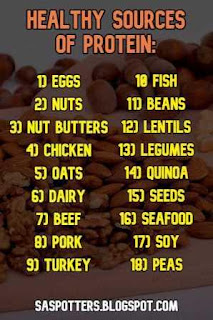

No comments:
Post a Comment